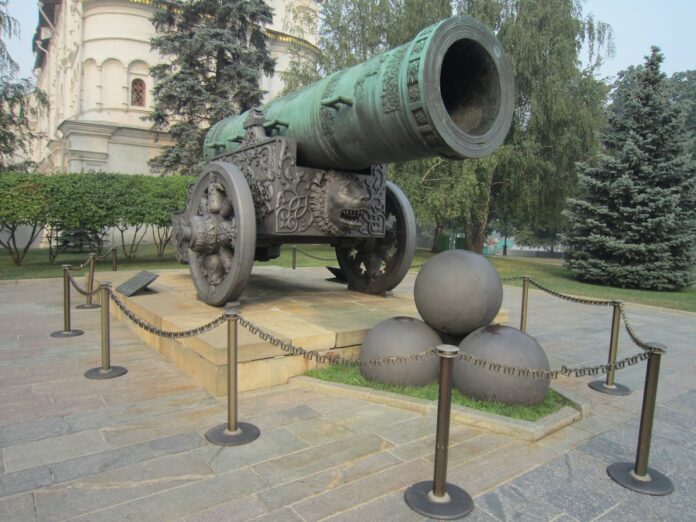Russian armored vehicles stationing along Ukraine’s borders do not only threaten peace in Eastern Europe, also there is much more. Kiev is the world’s fourth largest producer of wheat and sixth largest producer of corn. If the Kremlin decided on total war, the system of trade and food prices would be disrupted, and everyone would pay the economical consequences. The same can be said for the defensive armaments of the continent’s Eastern countries, in which enormous additional capital would have to be invested to make the borders of the European Union truly secure. And again: a blockade on gas exports by the Russians would have to be compensated in the Old Continent by a rather expensive diversification of supplies, in which the US would take the lion’s share.
Who would benefit from a conflict at Europe’s doorstep?
It is reasonable to ask what the Russian leadership could gain from all of this. In economic and material terms, it would certainly gain very little, because a complete change of directions of oil and gas exports towards China would not be convenient. Moreover, it would not compensate for the enormous effort required by a massive deployment of troops in the West. Not to mention the renewed race for increasingly more expensive armaments that would immediately be triggered. So, it is appropriate to describe what is happening in the political climate in the endless country that Putin now governs in a dictatorial manner.
A culture of disobedience matures in the former URSS
The initial timid openness to Western freedoms could not but generate in the East emulation phenomena and tides of oppositional opinions to the institutions and culture of the former Soviet Union. Putin felt that this was dangerous for the stability that he had painstakingly managed to create in his first years of government. Targeted murders, radioactive poisoning (see Navalny case), and various laws against freedom of expression have filled Russian prisons with intellectuals, activists, and ordinary people, accused of being “extremists” or “agents in the pay of foreigners”. According to ISPI there have been at least 3,500 arrests and 110 cities involved (https://www.ispionline.it/it/tag/alexei-navalny). The aim is to stifle dissent and fight the distrust that Russian people have always had towards their politicians.
The old rhetoric of the homeland in danger and the enemy at the gates is still useful to Putin.
In Russia the only institution above criticism is the army, whose heroes, sacrificed in the terrible “Great Patriotic War”, are frequently and everywhere commemorated. Bringing the army under the spotlight of national and international media is a choice of internal politics. National unity and consensus are achieved in front of the enemy, and this is what the head of the Kremlin is focusing on. Perhaps there is the will to make people forget that after almost thirty years since the end of communism, the largest and richest country in the world has not been able to create the consumer industry that is the basis of the welfare of Western countries.
I veicoli corazzati russi che stazionano lungo i confini dell’Ucraina non minacciano solo la pace nell’Europa dell’Est. C’è molto di più. Kiev è il quarto produttore mondiale di grano e il sesto di mais. Se al Cremlino si decidesse la guerra totale il sistema degli scambi e dei prezzi dei generi alimentari ne uscirebbe sconvolto. Tutti ne pagherebbero le conseguenze in termini economici. Lo stesso si può dire per quanto riguarda gli armamenti difensivi dei Paesi orientali del Continente, in cui si dovrebbero investire enormi capitali supplementari per rendere i confini dell’Unione Europea veramente sicuri. E ancora: un blocco dell’export di gas da parte dei russi dovrebbe essere compensato nel Vecchio Continente da una diversificazione delle forniture piuttosto costosa, in cui gli Usa farebbero la parte del leone.
A chi può servire un conflitto alle porte dell’Europa ?
È ragionevole chiedersi quali vantaggi possa trarre da tutto questo la leadership russa. In termini economici e materiali certamente molto poco, perché una virata a 180° delle esportazioni di petrolio e gas verso la Cina non sarebbe conveniente di per sé. E non compenserebbe l’enorme sforzo richiesto da uno spiegamento massiccio di truppe a Ovest. Per non parlare della rinnovata corsa agli armamenti sempre più costosi che si innescherebbe immediatamente. Dunque è opportuno inquadrare ciò che sta avvenendo nel clima che si respira nello sterminato Paese che Putin governa ormai in maniera dittatoriale.
Nell’ex Urss matura una cultura della disobbedienza
L’iniziale timida apertura alle libertà occidentali non poteva che generare a Est fenomeni di emulazione e correnti d’opinione di opposizione alle istituzioni e alla cultura ex sovietica. Putin ha ritenuto che ciò fosse pericoloso per quella stabilità che faticosamente era riuscito a creare nei suoi primi anni di governo. Omicidi mirati, avvelenamenti radioattivi (vedi caso Navalny), e varie leggi contro la libertà d’espressione hanno riempito le carceri russe di intellettuali, attivisti e gente comune, accusati d’essere “estremisti” o “agenti al soldo degli stranieri”. Secondo l’ISPI almeno 3.500 arresti e 110 città coinvolte. È evidente lo scopo di soffocare il dissenso e combattere la sfiducia che da sempre il popolo russo nutre nei confronti dei propri politici.
La vecchia retorica della Russia in pericolo e del nemico alle porte serve ancora a Putin
In Russia l’unica istituzione al di sopra di ogni critica è l’esercito, di cui si commemorano frequentemente e dappertutto gli eroi sacrificatisi nella terribile “grande guerra patriottica”. Portarlo sotto i riflettori dei media nazionali e internazionali è una scelta di politica interna. L’unità nazionale e il consenso si realizzano di fronte al nemico e su questo sta puntando il capo del Cremlino. Forse per far dimenticare che dopo quasi trent’anni dalla fine del comunismo, il Paese più grande e più ricco del mondo non è stato capace di far nascere quell’industria di consumo che sta alla base del benessere dei Paesi Occidentali.
Su Russia ed Est Europa leggi anche: Ukraine Special/ Its historical backgorund – La Russia e l’est europeo








